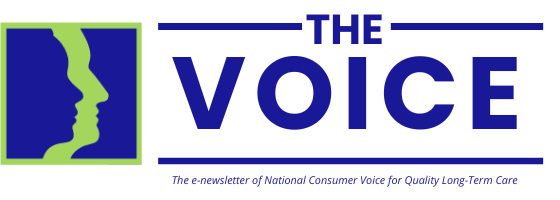|
August 23, 2022
In this Issue:
- CMS Provides Details on Staffing Study; Listening Session Next Monday
- CMS Urges States to Use Medicaid Payments to Nursing Homes to Drive Better Care and Improve Staffing
- HHS Expands Money Follows the Person Program to Five New States and Territories
- Materials Available from Webinar on Advocating for LGBTQ+ Residents
|
|
CMS Provides Details on Staffing Study; Listening Session Next Monday
Earlier this year, President Biden announced a comprehensive set of reforms to improve safety and quality of nursing home care. One initiative of these reforms is to establish new minimum staffing requirements, ensuring that every nursing home has sufficient staff who are adequately trained. In April of this year, the Centers for Medicare & Medicaid Services (CMS) issued a Request for Information (RFI) asking for input on a variety of issues related to a minimum staffing standard. Read Consumer Voice’s responses to the RFI.
In its August 22, 2022 blog post, CMS noted it received "divergent views on the establishment of minimum staffing levels" from industry associations and nursing home resident advocates. Advocacy groups and family members of residents generally supported establishing a minimum staffing standard, but industry and provider groups expressed concern. CMS stated that it is its goal to "consider all perspectives" when crafting the minimum staffing requirements.
Central to CMS’ goal of establishing a minimum staffing standard is a multi-faceted staffing study to be conducted by CMS. In its blog post, CMS laid out its plan for the staffing study which includes:
- Literature review: a review of existing studies and information to summarize the relationship between care quality and safety and staffing levels.
- Site visits to nursing homes and related analyses: CMS will visit 50 to 75 nursing homes to interview staff and residents regarding staffing levels and care. In addition, CMS will be collecting observational data on care provisions to develop a simulation model to document the impact of different staffing levels on care quality. The goal, as stated by CMS, is to document not just what staffing levels currently exist, but what levels are needed to meet all residents needs.
- Quantitative analyses: CMS will study payroll data from nursing homes from 2018-2021 to identify staffing levels associated with better care.
- Cost analyses: CMS will use the data collected in the previous steps to attempt to ascertain the additional costs, if any, of a minimum staffing standard.
Learn more about CMS’ staffing study in their blog post.
Listening Session - Monday, August 29th at 1:00pm ET
CMS is conducting a stakeholder listening session to provide information on the study and solicit additional stakeholder input on minimum staffing standards. Register early as the event has a maximum limit of participants.
Register to attend here.
|
|
CMS Urges States to Use Medicaid Payments to Nursing Homes to Drive Better Care and Improve Staffing
The Centers for Medicare & Medicaid Services (CMS) issued an informational bulletin on actions that states can take using existing Medicaid authorities in order to drive better health outcomes for nursing home residents and improve staff pay, training and retention efforts. CMS recommends that states tie Medicaid payments to quality measures that will improve safety and quality care in order to ensure that nursing homes are adequately resourced and staffed. CMS also encourages states to seek to achieve "a more equitable balance between the share of spending and use of services and supports delivered in home and community-based settings relative to institutional care like nursing homes."
Read the informational bulletin that was sent to states.
|
|
HHS Expands Money Follows the Person Program to Five New States and Territories
The Department of Health and Human Services (HHS), through the Centers for Medicare & Medicaid Services (CMS), has awarded approximately $25 million to five new states and territories to expand Medicaid's Money Follows the Person (MFP) demonstration program. A total of 41 states and territories across the country will now participate in MFP. MFP provides funding to assist older adults and people with disabilities to safely transition from institutional care back to their homes and communities. Illinois, Kansas, New Hampshire, American Samoa, and Puerto Rico will receive awards of up to $5 million to support the early planning phase for their MFP programs.
For more information, read the press release from CMS.
|
|
Materials Available from Webinar on Advocating for LGBTQ+ Residents
Materials are available from the National Long-Term Care Ombudsman Resource Center (NORC) and Consumer Voice's webinar, "Voices for Equality: Advoacting for LGBTQ+ Residents." This webinar served to equip attendees with an understanding of the challenges LGBTQ+ residents face, build familiarity with federal, state, and local policy, and help attendees walk away with resources on LGBTQ+ inclusion, such as the new Long-Term Care Equality index (LEI), a national LGBTQ+ benchmarking tool. Thanks to speakers, Dan Stewart, Associate Director, the Aging Equality Project, Human Rights Campaign Foundation, and Sherill Wayland, Director, Special Initiatives, SAGE.
Get the recording and materials.
|

|
